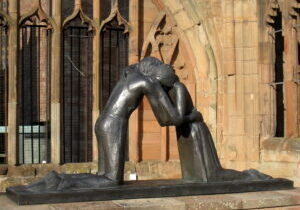From the Fullness of the Heart
“From the fullness of the heart the mouth speaks” (Lk 6:45)
 On this Eighth Sunday in Ordinary Time, the readings remind us that wisdom is not always evident in human affairs. This is a timely reminder as we deal with the reality of war in Ukraine. In the Diocese of Monterey, CA, Bishop Daniel Garcia has asked us to use a different set of Eucharistic prayers this Sunday than the usual ones. There are four ordinary Eucharistic prayers that are typically used on Sunday. But there are others that are for times of special need or celebration. Any of these can be used equally validly for the Mass. The prayers Bishop Garcia has asked be used are for times of war.
On this Eighth Sunday in Ordinary Time, the readings remind us that wisdom is not always evident in human affairs. This is a timely reminder as we deal with the reality of war in Ukraine. In the Diocese of Monterey, CA, Bishop Daniel Garcia has asked us to use a different set of Eucharistic prayers this Sunday than the usual ones. There are four ordinary Eucharistic prayers that are typically used on Sunday. But there are others that are for times of special need or celebration. Any of these can be used equally validly for the Mass. The prayers Bishop Garcia has asked be used are for times of war.
Ordinarily, there are readings that are used for each day’s Mass. We have three different sets of readings that are repeated over a period of three years. However, the Masses for special purposes or times may have their own set or sets of readings. I don’t know which ones will be used in parishes around the diocese or around the world today. However, I know which ones are the “usually scheduled” ones and another set that may be used. Fortunately, they have themes that make sense together. So, here are some thoughts about them.
The first of the regular readings is from the Book of Sirach (27:4-7). Sirach is one of the books of Wisdom literature in the Bible. It is not always included in Protestant Bibles. The book includes a collection of proverbs and observations of human behavior and its consequences. These are drawn from events and practices that would have been familiar to the people hearing them. Sirach notes that it is in times of upheaval and trial that strength is developed (as in the firing of pottery). When grain is shaken through a sieve, the grain becomes usable and the husks are removed. The reading concludes with the observation that until a person speaks, there is no way to know their character, so they should never be praised first!
St. Paul’s first letter to the Corinthians (15:54-58) continues the contrast of the earthly, mortal, corruptible world (described as clothes) with immortality. We have been hearing about various aspects of this for the past few weeks. It is to the realm of immortality that the promises of God pertain. Death is not the end. It is “swallowed up in victory,” a victory received through Jesus, Our Lord. Therefore, he calls upon his sisters and brothers in faith to be firm and steadfast in the work of the Lord. This labor from the heart will not be in vain.
In the final reading of the regular set, St. Luke continues the Sermon on the Plain (6:39-45). Jesus asks a series of questions of his listeners. “Can a blind person guide a blind person?” “Why do you notice the splinter in your brother’s eye, but do not perceive the wooden beam in your own?” He also offers some commonsense observations. “A good tree does not bear rotten fruit…” “People do not pick figs from thorn bushes…”
Jesus concludes this set of observations with the statement, “For from the fullness of the heart the mouth speaks.”
It seems to me that this is the heart of the matter. When we make choices based on the values of the world around us, we may find some success or admiration, but it will come for the wrong reasons. As we all know, beauty fades, styles change, success eventually ends. What is it that will remain? What will our families and friends remember about us as they prepare to lay us to our final rest?
Alternate readings for this day touch on many of the same themes. The story of Cain and Abel in the book of Genesis (4:3-10) describes the result of envy and anger between two brothers. Both offer gifts to the Lord, but when Abel’s gift is burned the smoke goes up. When Cain’s gift is burned, the smoke goes down. Cain is angry that his gift was not received by the Lord. The Lord warns him about the danger of his anger, but he does not listen. He invites his brother to go out into the field with him. They quarrel and Abel is killed. The Lord comes looking for them and asks Cain where his brother is. Cain responds, “I do not know. Am I my brother’s keeper?” Of course, the Lord already knows. He tells Cain that Abel’s blood cries out from the earth and banishes Cain from the land. Cain must travel to other lands and live among the people there.
(Note: this is not historical writing. This story is to help explain conflict among people and nations. Despite being one of only three sons named as children of Adam and Eve, there are peoples in other nations among whom he is to go to live. Not intended as historical fact! A story to teach us something important. An example of wisdom literature.)
St. James (4:1-10) warns the early Christian community of the dangers of envy and struggles for worldly pleasures. These are the source of anger, fights, quarrels, wars. These are not the signs of God’s friends. Indeed, they are signs of those opposed to God’s ways. “God resists the proud but bestows his favor on the lowly.” James calls the community to turn back to God with prayer and humility – to purify their hearts and be humble. Then the Lord will raise them on high.
Finally, St. Matthew, in his account of the Sermon on the Mount (5:20-24), presents Jesus’ teaching against anger. “You have heard the commandment … ‘You shall not commit murder.’ What I say to you is: everyone who grows angry with his brother shall be liable to judgement.”
These are strong words. Those who are angry must reconcile with their opponents, their brothers and sisters, before bringing their gifts to the altar. It’s the reality of what is in our hearts that matters. It is in the heart that the Lord meets us and we meet the Lord.
And so, we return to our beginning verse, “From the fullness of the heart the mouth speaks.”
May we remember this as we enter into Lent later this week. May we remember this as we watch the war in Ukraine and pray for peace. May we remember this as we deal with the ups and downs of our own lives in community, in family, in work and play.
“From the fullness of the heart, the mouth speaks.” May our words and actions be those of peace.










